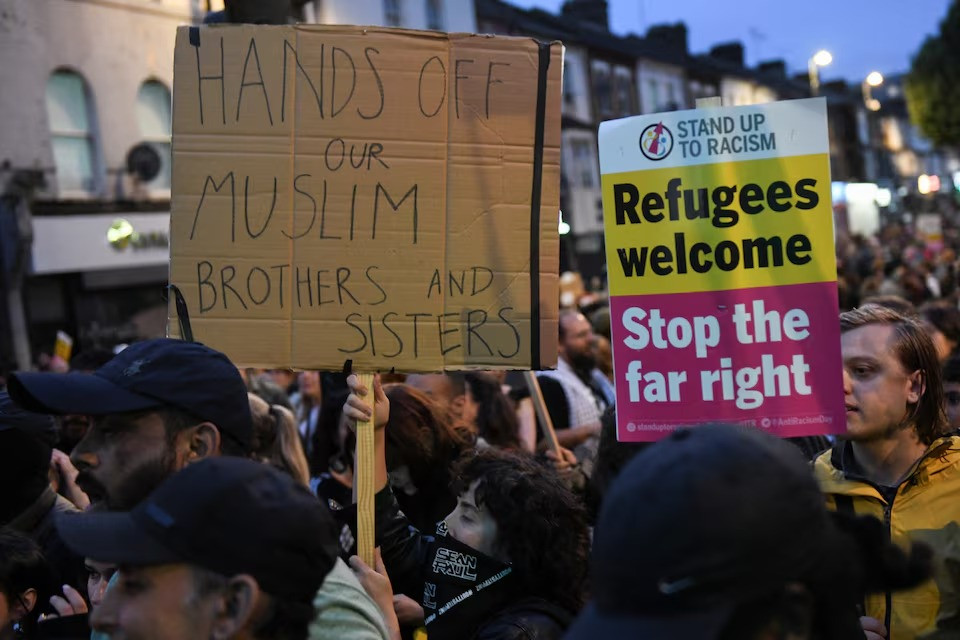
Streets across Britain saw thousands of police officers and anti-racism protesters assembling to counter expected far-right groups. These groups, however, did not materialise after a week of violent racist attacks targeting Muslims and migrants.
The recent unrest in Britain was triggered by a knife attack in Southport, northwest England, which resulted in the deaths of three young girls. False online messages wrongly identified the suspected killer as a Muslim migrant, inciting the riots.
Online posts suggested that far-right, anti-Muslim protesters would target various immigration centres, migrant support centres, and specialist law firms on Wednesday. This led to early closures of many businesses and some shops boarding up their windows.
In response, thousands of police officers were deployed, and crowds of protesters gathered in towns and cities, including London, Bristol, Birmingham, Liverpool, and Hastings. They held banners with messages such as "Fight racism," "Stop the far right," and "Will trade racists for refugees."
The protesters comprised a diverse group, including Muslims, anti-racist and anti-fascist groups, trade unionists, left-wing organizations, and local residents outraged by the recent riots.
By 9 p.m. (2000 GMT), there were no reports of serious disorder. Police reported a minor incident in Croydon, south London, where around 50 people threw bottles and attempted to cause disruption.
Stetson Matthew, a 64-year-old waste collector who joined the demonstrators in Walthamstow, northeast London, emphasised the importance of peaceful protest. "Everybody has the right to do what they need to do but what they must do is to put their voices across peacefully, amicably, without any stress or violence," he said.
Lucy, a 37-year-old flower grower who joined a counter-protest in Hastings, southeast England, expressed relief at the large turnout. "I felt I absolutely had to be here tonight to take a stand, and it is much easier for me to come as a white woman than for some of my non-white friends, so I'm here in solidarity," she stated.
The riots last week saw groups of predominantly men clashing with police and vandalising hotels housing asylum-seekers from Africa, Asia, and the Middle East.
The rioters chanted slogans like "get them out" and "stop the boats," referring to those arriving in Britain in small dinghies without permission. Mosques were also targeted with rocks, prompting Muslim organizations to issue community safety advice.
Prime Minister Keir Starmer, facing his first crisis since winning the July 4 election, warned rioters of severe consequences. He pledged to stamp out the worst outbreak of violence in Britain in 13 years, promising lengthy jail terms for those involved.
On Wednesday, a 58-year-old man was jailed for three years for violent disorder, while two others, aged 41 and 29, received sentences of 20 and 30 months, respectively. "This is the swift action we're taking. If you provoke violent disorder on our streets or online, you will face the full force of the law," Starmer stated.
Migration played a significant role in Britain's 2016 vote to leave the European Union and was a central issue during last month's election. Nigel Farage's Reform Party garnered around 4 million votes with calls for stricter border controls.
Britain saw record net migration levels in 2022, with numbers buoyed by those arriving from Ukraine and Hong Kong, and through work and student visas.
Net migration through legal means was some 685,000 in 2023, while 29,000 people arrived on small boast across the Channel, many having fled war zones. The far-right chants of "stop the boats" was also a slogan of the Conservative Party before it was swept out of power after 14 years at the election.
The government has put together a so-called "standing army" of 6,000 specialist police officers to respond to any violence.
The National Police Chiefs' Council said more than 120 people had been charged and 428 arrests made in connection with the disorder.
1729662874-0/One-Direction-(1)1729662874-0-405x300.webp)


1722421515-0/BeFunky-collage-(19)1722421515-0-165x106.webp)






1732101971-1/Copy-of-Untitled-(53)1732101971-1-270x192.webp)






COMMENTS
Comments are moderated and generally will be posted if they are on-topic and not abusive.
For more information, please see our Comments FAQ